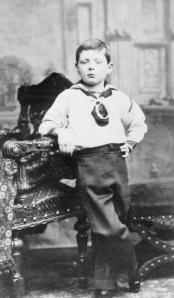My goal is to read about 30-40 books a year.
Since my wife and I have young children, reading is difficult to achieve in our stage of life. I remember being frustrated a couple of years ago about this and wanted to find a solution to feed my mind’s curiosity.
Then I discovered audiobooks.
People learn in different ways. I have friends who can read 50 or 60 books a year without breaking a sweat. I wish I could get to that point as a reader but I’ve discovered that I absorb information better through from the spoken word of an audiobook.
 Before there were books, there was the beauty of the spoken word.
Before there were books, there was the beauty of the spoken word.
For thousands of years, stories were passed down from word of mouth, primarily because literacy was reserved for the elite and books were difficult to reproduce. Human history tells us that we are designed as humans to listen to others tell stories and share with the next person.
The reading purist may think I’m a heretic but my goal here is to help people discover more books through the way they can get the most out of them. I still read about 15 to 25 books a year in addition to audiobooks and I believe balance in reading is important.
I listen to audiobooks in the car on my drive to work, on long road trips, and when I work out during the week. I have hours of time that would go wasted without audiobooks, which makes me very thankful for them.
I’ve listened to many audiobooks and to be honest some are recorded with poor quality or are read by a voice that I don’t like. In those times, I stop listening and move on to the next. It’s okay to ditch one if it doesn’t work for you.
But, there are some excellent ones to choose from.
Here are five great audiobooks
Where Men Win Glory: The Odyssey of Pat Tillman by Jon Krakauer (read by award-winning voice talent, Scott Brick)
I loved this because I was always. As the author Krakauer makes a point in his book about Pat Tillman, he seems like a Greek athlete and personality of old.
WAR by Sebastian Junger (read by the author)
I thought this book had an important story to understand, especially from the words read by author Sebastian Junger. Since he was embedded with an Army Ranger company in Afghanistan for over a year, his words would have more passion and meaning than another voice.
Flyboys: A True Story of Courage by James D. Bradley (read by the author)
You all probably know that I love history books and this is one read by author James Bradley is a harrowing tale of Navy flyboys during World War II in the Pacific. With his Wisconsin accent, Bradley shares harrowing stories of these men in one of the most tragic stories you’ve never heard of from World War II.
Young Titan: The Making of Winston Churchill by Michael Shelden (read by John Curless)
Although written by an American, it is read by an English voice talent, John Curless, who reads the book with an Edwardian pomposity. I love listening to books written about British people. Don’t we all?
Outliers: The Story of Success by Malcolm Gladwell (read by the author)
There is a cadence to the voice of Malcolm Gladwell and his soft tone brings curiosity to the listener and releases the spirit of the author’s ideas. I think business books are great to listen to for the business traveler, who is traditionally on the run.
Notice how I did not mention fiction audiobooks. I have nothing against them except for idea that I believe fiction books are meant to stretch the imagination of the reader. Last year, I listened to a few and felt like the experience would be better by traditionally reading them. I can’t imagine listening to The Lord of the Rings, Huckleberry Finn, A Wrinkle in Time, or The Chronicles of Narnia for that reason. If you find some good ones to listen to, I’d love to hear your recommendations.
Questions consider before picking the right audiobook
- How long do you have to listen to an audiobook?
- Do you have a road trip coming up?
- Do you have a long commute to work?
- Do you work out multiple times a week?
- Do you want to listen to the author or a professional reader? Would either make it a better listening experience?
- Is a physical CD or digital version preferable for you?
Where to get audiobooks
Physically buy them at a store: These are often the most expensive ($20-50)
Digital editions: Choose from iTunes, Amazon.com, ChristianBook.com, AudioBooks.com, or Audible.com ($10-$30)
Public Library: This is where I get 90% of my audiobooks because yes, they are FREE. I don’t mind owning an audiobook because I can always check it out again.
Free audiobooks: You can download classic audiobooks Charles Dickens, Jane Austin, Joseph Conrad, and Fyodor Dostoyevsky. Here are two great places to download classic books free. Librivox and Open Culture.
Caution: I don’t recommend listening to a comedy audiobook while working out. I literally dropped a dumbbell on my head when working out listening to Stephen Colbert read and act out America Again.
Do you like audiobooks?
If so, which ones have you enjoyed most and why?














